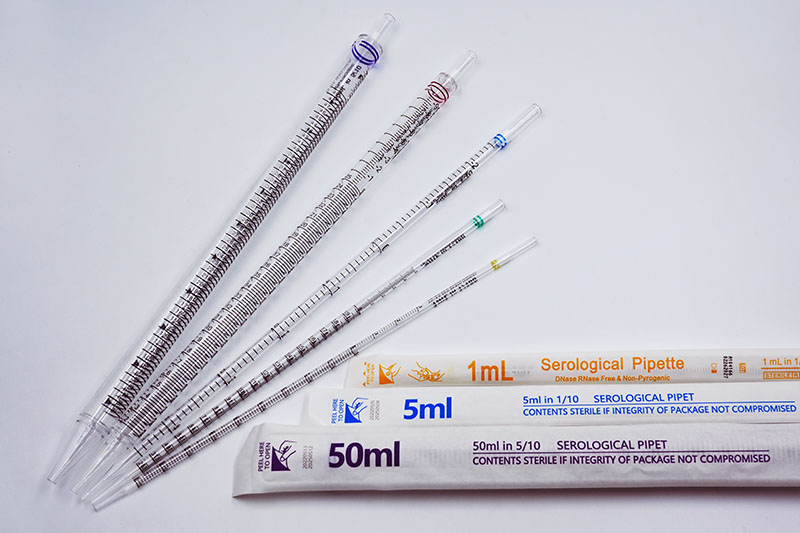With the continuous improvement and perfection of various processing techniques, polymer materials are made into various products and used in many fields. Serological pipettes are disposable laboratory consumables used to accurately measure or transfer liquids. They are generally made of polystyrene (PS). PS is a colorless and transparent thermoplastic with the following characteristics:
1. Mechanical properties: PS is a hard and brittle material with very small ductility and no yielding when stretched. The mechanical properties of polystyrene are related to the synthesis method, relative molecular mass, temperature, impurity content and testing methods.
2. Thermal properties: PS has poor heat resistance, with a heat deformation temperature of 70 to 95°C and a long-term use temperature of 60 to 80°C. Therefore, serological pipettes cannot be sterilized by high temperature and high pressure, and radiation sterilization is generally chosen. The thermal conductivity of polystyrene is low, about 0.10~0.13W/(m·K), and it basically does not change with temperature changes. It is a good thermal insulation material.
3. Electrical properties: PS is a non-polar polymer, and few fillers and additives are added during use. Therefore, it has good dielectric properties and insulation, and its dielectric properties have nothing to do with frequency.
4. Chemical properties: PS has relatively good chemical stability and can withstand various alkali, general acids, salts, mineral oil, lower alcohols and various organic acids.
The above are some characteristics of the material of the serological pipettes. The good chemical stability ensures that the solution and the tube will not react, thus ensuring the accuracy of the experiment.
The FAI climbed 5.9 percent year-on-year in the first 11 months of 2018, quickening from the 5.7-percent growth in Jan-Oct, the National Bureau of Statistics (NBS) said Friday in an online statement.
The key indicator of investment, dubbed a major growth driver, hit the bottom in August and has since started to rebound steadily.
In the face of emerging economic challenges home and abroad, China has stepped up efforts to stabilize investment, in particular rolling out measures to motivate private investors and channel funds into infrastructure.
Friday's data showed private investment, accounting for more than 60 percent of the total FAI, expanded by a brisk 8.7 percent.
NBS spokesperson Mao Shengyong said funds into weak economic links registered rapid increases as investment in environmental protection and agriculture jumped 42 percent and 12.5 percent respectively, much faster than the average.
In breakdown, investment in high-tech and equipment manufacturing remained vigorous with 16.1-percent and 11.6-percent increases respectively in the first 11 months. Infrastructure investment gained 3.7 percent, staying flat. Investment in property development rose 9.7 percent, also unchanged.
 English
English



















































 Serological Pipettes
Serological Pipettes